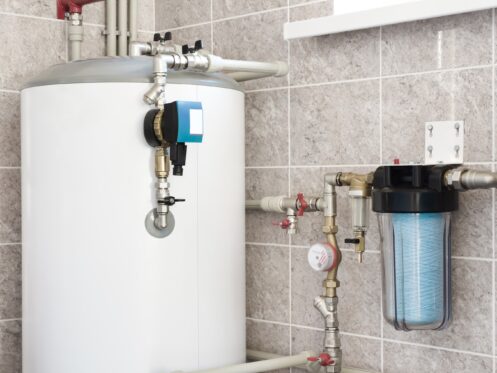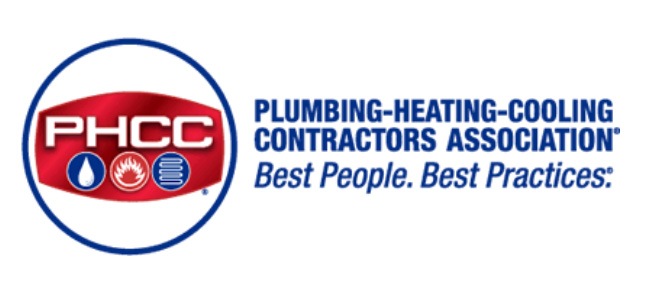The temperature you set your water heater to makes a difference for a few different reasons. One is that it directly impacts how high your energy bills are. Ensuring you have your water heater set to a high enough temperature is also key for preventing bacteria and viruses from growing in the hot water tank. At the same time, you don’t want your water to be too hot or else you could get scalded.
Should You Turn Your Water Heater Temperature Up in Winter?
You’ll hear some people say setting your water heater to a higher temperature during the winter helps ensure your water is always fully hot. The water coming into your house is indeed a bit colder during the winter.
Nonetheless, as long as your water heater still works effectively, it should never have any issues heating the water to whatever temperature it’s set at. The fact that the water coming into the unit is colder means it can take a bit longer for it to get fully hot, but this is mostly only an issue if you have a tank water heater and you’ve used up all of your hot water.
The main issue in the winter is that some of the pipes in a house are colder. When you turn the water on, it can take a bit more time before hot water starts flowing out of a faucet or shower. That’s because the water loses quite a bit of heat at first when it flows through cold pipes, and the pipes need to heat up before the water finally starts flowing as hot as it should be.
This is where turning the temperature on your water heater up by 10-20 degrees for the winter can be beneficial, as it will result in your pipes heating up faster. That means you can save a bit of water since you won’t need to wait as long for it to get hot whenever you shower, wash your hands, and do the dishes.
The downside to turning the temperature up is that your water heater will use more energy, leading to your gas or electricity bill increasing. As such, you need to think carefully about whether saving a bit on your water bills is worth paying more in energy costs. If you do decide to turn the temperature up during the winter, you should make sure you turn it back down once winter is over so that you can keep your gas or electricity bills lower.
What Temperature Should Your Hot Water Be?
The normal temperature range for most water heaters is between 100 and 160 degrees. Some units also have a “vacation” setting, which normally keeps the water at around 50 degrees. The purpose of this setting is to greatly reduce how much energy the water heater uses while you’re away and keep the water warm enough that it can’t freeze if your heating were to go out.
On many newer water heaters, the lowest temperature setting is 120 degrees. Even if you can set your unit to only 100 degrees, it’s not something you should ever do. That’s because many harmful bacteria and viruses can thrive in water that’s this temperature.
If you have your water heater set to a minimum of 120 degrees, the water will be hot enough to kill the vast majority of pathogens. However, some pathogens like Legionella can sometimes survive in 120-degree water. As such, you may want to keep your water heater set to at least 130 degrees if there are elderly people, infants, or anyone else with a weaker immune system in your household.
Generally speaking, 140 degrees is the highest a water heater should ever be set to. Anything above that and you create an extremely high risk of someone getting scalded. Even 140-degree water can still cause scalding, which is why experts generally say 120-130 degrees is best if you have young kids in the house. If you normally have your water heater at 140 degrees, it’s also a good idea to turn the temperature down any time someone else’s young children will be at your house.
The EPA recommends just always leaving your water heater set to 120 degrees throughout the year to minimize the amount of energy the unit uses. On the other hand, some experts recommend always keeping your hot water at 140 degrees to clean and sterilize everything in your kitchen more effectively.
There’s really only one time when it would ever make sense to turn your water heater up to 160 degrees. This applies if you’ve been away and your water heater was set to vacation mode. The reason turning the temperature up all the way can be beneficial in this situation is that will kill any pathogens that may be present in the water more quickly. However, you want to monitor your water heater and make sure to turn the temperature back down as soon as the water is fully hot and the unit shuts off.
What Can Cause Your Hot Water to Be Too Cold or Too Hot?
Having your water frequently be hotter than it should be is somewhat of a rare issue. Nonetheless, it can happen as a result of the water heater’s controller or thermostat not working correctly. Luckily, a plumber can swap out the faulty component for a new one fairly easily so that your hot water again stays at the right temperature.
A faulty controller or thermostat can also result in your hot water frequently being colder than it should. Nonetheless, this issue can also occur for a variety of other reasons. For instance, if you have an electric water heater, there’s a good possibility that one of the heating elements is worn out and no longer functions.
Another possibility is that there’s a major sediment buildup within the water heater tank and you need to have it drained and flushed. This last issue typically won’t prevent your water from eventually getting fully hot, but it can definitely lead to it taking a far longer time for the water to heat up.
The majority of common water heater issues can be easily prevented with regular maintenance from a water heater services expert. Maintenance also provides the benefit of helping the unit to work more efficiently and keeping your energy bills down. Another reason having a plumber inspect and service your water heater is crucial is that it can help protect the life of the unit and potentially allow you to get a few additional years of life out of it.
Reach Out to Your Local Water Heating Experts
When you need any water heater, air conditioning, or heating services in Sterling or the surrounding areas in northern Virginia, Meade’s Heating and Air is the contractor to turn to. We have years of experience and are dedicated to providing reliable, trusted HVAC and water heating solutions. If you have any problems with the hot water in your home, give us a call, and we’ll make sure the problem is fixed quickly and correctly.




